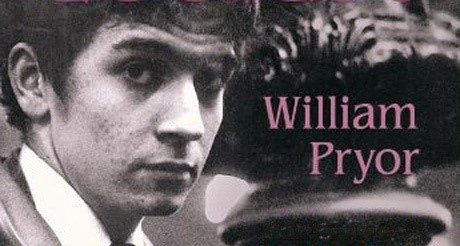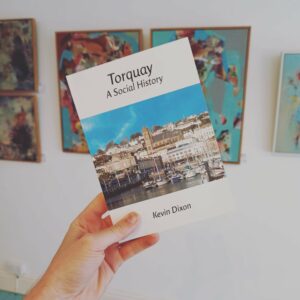Acclaimed author and poet William Pryor (1945- ) is the great-great-grandson of Charles Darwin. But what interests us here is how he came to own an alternative bookshop in Torquay and his time in the resort. His journey takes us from Eton and Cambridge to a revenge beating in a town centre car park.
We know of Willaim’s life from his autobiography, The Survival of the Coolest, which tells “of a descent into addiction by a privileged beatnik manning the counter-cultural barricades with the likes of Alex Trocchi, Syd Barrett and Viscount Billy Bolitho.”
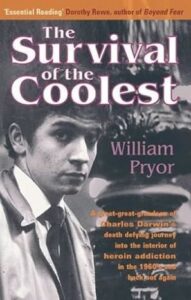 William grew up in Cambridge and in the early 1960s associated with a bohemian crowd “including black GIs and Syd Barret and David Gilmour who would found Pink Floyd”. At this time he started “smoking West Indian dope”.
William grew up in Cambridge and in the early 1960s associated with a bohemian crowd “including black GIs and Syd Barret and David Gilmour who would found Pink Floyd”. At this time he started “smoking West Indian dope”.
In 1962 he became a Dadaist beat poet and part of the 60s avant-garde counterculture. He was the focus of a half-page photo in a Life Magazine article on British High Society: “Genuine Old Etonian William Pryor cannot resist the rites of the 4th of June”.
The same year he took his first opium in the form of ‘cooked’ Dr Collis Browne’s Chlorodyne, and soon after became a heroin addict registered with the Home Office.
In 1965 William was involved in Wholly Communion.
In May 1965 American Beat poet Allen Ginsberg had arrived at Better Book in London and offered to read anywhere for free. Plans were then made for the International Poetry Incarnation at the Albert Hall, also to be known as Wholly Communion, on 11 June 1965.
The event attracted an audience of 7,000 people to readings and live and tape performances by a wide variety of figures, including William S Burroughs, Gregory Corso, Lawrence Ferlinghetti and Allen Ginsberg. The event was formative for what became the UK underground.
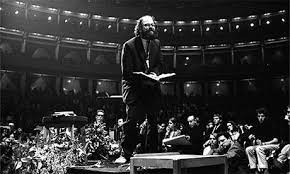 Incidentally, Mike Williams, who was part of the beatnik and hippy scene in Torquay, says that this event contributed to the reshaping of the Bay’s counter culture and led to some of the social issues that we still see today. “The end of the Beatnik period can be dated absolutely: to the Wholly Communion poetry gig at The Albert Hall in London in the autumn of 1965.” After this, he says, the creativity of the Torquay Beatniks was overcome by drugs and pessimism.
Incidentally, Mike Williams, who was part of the beatnik and hippy scene in Torquay, says that this event contributed to the reshaping of the Bay’s counter culture and led to some of the social issues that we still see today. “The end of the Beatnik period can be dated absolutely: to the Wholly Communion poetry gig at The Albert Hall in London in the autumn of 1965.” After this, he says, the creativity of the Torquay Beatniks was overcome by drugs and pessimism.
A year after Wholly Communion, William was caught changing the quantities on a prescription for heroin and cocaine. He was then fined heavily and asked to resign from Trinity College within six weeks of his finals. The story about the conviction featured on the page two of the Times.
In 1972 William moved to Torquay and opened Cosmic Books, just off Market Street.
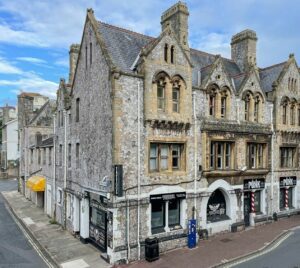 By that time he was addicted to heroin but, along with other incomers, he was still not prepared for the easy accessibility of narcotics in his new home, “It was devastating. I had always assumed Torquay to be sedate, prim, palm-treed and junk-free as its image would suggest.”
By that time he was addicted to heroin but, along with other incomers, he was still not prepared for the easy accessibility of narcotics in his new home, “It was devastating. I had always assumed Torquay to be sedate, prim, palm-treed and junk-free as its image would suggest.”
Following his arrival, William further became dependent on alcohol when Torquay’s opiates temporarily became hard to obtain:
“There were at least six pubs within two hundred yards of my front door and the stuff was legal. Soon I was going to pubs as soon as they were open in the morning, until it struck me that it would be much more convenient and cheaper if I simply bought a few bottles to drink at home. I would have a largish tot of rum and coke before I went down to the shop in the morning to steady my nerves. Within three months of my first drinking session I was displaying the symptoms of chronic alcoholism: drinking at least a bottle of spirits a day.”
He was hospitalised three times, and neared death from alcohol poisoning.
In 1973 William was “busted by local drugs squad as customer of local pushers of ‘Chinese’ heroin.” To secure immunity from prosecution, he turned Queen’s Evidence, his testimony sending his suppliers to prison. Torquay’s dealers and their friends were not the forgiving type:
“The night after the trial Joy and I went to the nearest discotheque to celebrate the end of the trial. As we made our way home at two in the morning through an underground car park, two men stepped out from behind another pillar. One of them swung his fist at me, hate contorting his face. He got me hard in the mouth, I was knocked out, flat on the ground. The fist of rage had knocked out my four top front teeth clean out of my head.”
Brought on by this police sting, his subsequent “crash-landing at what Alcoholics Anonymous describes as ‘rock bottom’” marked the end of his addiction.
In 1975 William sold Cosmic Books and began his recovery, being one of the patients at the first American-style addiction treatment centre in Europe.
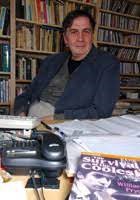 William published the memoir of his life and addictions in 2003. The book has been described as “essential reading for anyone who wants to understand why a War on Drugs and Just Say No can never work, and why some people become addicted to drugs while others do not.”
William published the memoir of his life and addictions in 2003. The book has been described as “essential reading for anyone who wants to understand why a War on Drugs and Just Say No can never work, and why some people become addicted to drugs while others do not.”
‘Torquay: A Social History’ by local author Kevin Dixon is available for £10 from Artizan Gallery, Lucius Street, Torquay, or:
https://www.art-hub.co.uk/product-page/torquay-a-social-history-by-kevin-dixon


